THOUSANDS on Universal Credit are being warned about “phantom” payments that could leave them out of pocket.
If you are on the benefit, working and your employer pays you through PAYE you could be impacted.
Thousands working and on Universal Credit could be hit with phantom payments
Employers have to send information to HM Revenue and Customs (HMRC) every time they pay a worker on Universal Credit.
The information includes an employee’s pay, payroll benefits and any tax deductions.
HMRC then relays the information to the Department for Work and Pensions who determine how much Universal Credit someone should be paid.
But if your employer or HMRC get any of the information wrong it could see you receiving less or more Universal Credit than you should have.
If you are paid more than you should, you’ll have to pay it back which can leave you out of pocket further down the line.
If your employer submits your pay information late, it could see later Universal Credit payments docked.
And if they don’t send the relevant information at all, it could mean you don’t get any Universal Credit payments.
HOAR recently spoke to a father-or-four who was left with no cash over the Christmas period after his employer forgot to send the relevant information to HMRC.
The DWP said such “phantom” payments, a word used by Rosie Mears from the Child Poverty Action Group in an All-Party Parliamentary Group in November last year, could impact thousands on Universal Credit every year.
You can self-report all the information your employer was supposed to send to HMRC, but this can cause added stress and delays which can impact Universal Credit payments.
If you’ve suffered a phantom payment, also known as a Real Time Information (RTI) error, you can get it rectified though.
What can I do if I’m impacted?
Anna Stevenson, senior welfare benefits specialist at anti-poverty charity Turn2Us, said you can check if you’ve experienced a RTI error using HMRC’s website or app.
She said: “If the wrong amount has been reported to HMRC, you’ll need to ask your employer to correct it.”
She added: “You should also contact the DWP and ask them to do an ‘RTI dispute’.
“This means that DWP will look again at the amount of earnings that have been reported to them and should be able to correct it.”
You can also flag a RTI error by posting on your journal.
The DWP has 14 days to look into your case and make a formal decision on your earnings for that period.
If you’re unhappy with what the DWP decides you can seek a “mandatory reconsideration” again by writing on your journal.
If you still feel the issue hasn’t been rectified, you can escalate it to a First Tier Tribunal.
A Department for Work and Pensions spokesperson said : “In the vast majority of cases using Real Time Information (RTI) supplied by employers is an efficient and accurate method of calculating Universal Credit payments.
“Fewer than 1% of remaining cases are referred to HMRC for clarification of earnings.
“If a claimant wishes to dispute the earnings information we have used, they can submit evidence to us, and we will look into the case to see if a change needs to be made.”
Do you have a money problem that needs sorting? Get in touch by emailing [email protected]








